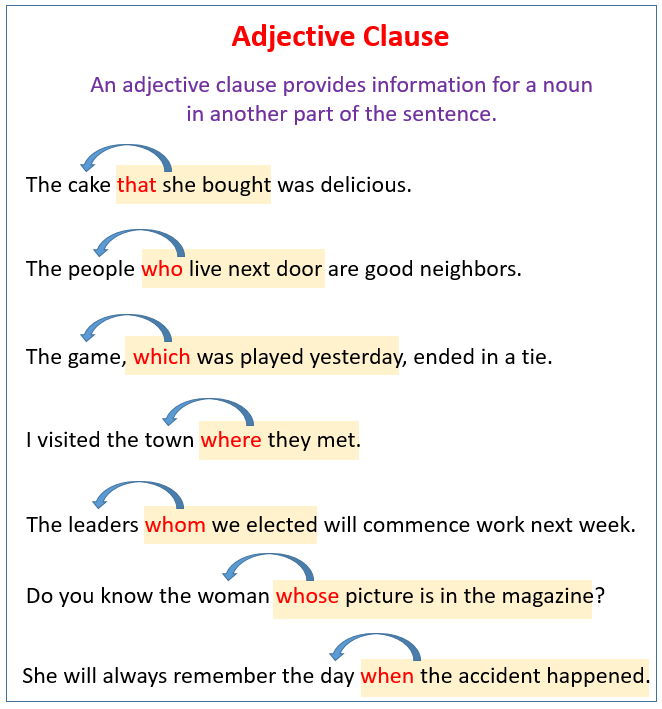Adjective Clauses
Related Topics:
More Lessons English as a Second Language
Welcome to our collection of English as a Second Language (ESL) tools & resources for students, teachers, and educators.
We have lots of free videos that will help you improve your English and also advice and tips that will help you in English proficiency examinations like TOEFL and IELTS.
What Is an Adjective Clause?
An adjective clause is a dependent clause that functions as an adjective. It describes or modifies a noun or pronoun in a sentence. Adjective clauses help provide additional information, making sentences more descriptive and detailed. Like all clauses, an adjective clause contains both a subject and a verb. However, as a dependent clause, it cannot stand alone as a complete sentence.
The following diagram gives examples of adjectives clauses that use the relative pronouns: Who, Whom, Whose, Which, That and the relative adverbs: When, Where and Why. Scroll down the page for more examples and explanations.

Examples of Adjective Clauses:
The book that I read last night was amazing.
Adjective Clause: that I read last night
Modifies the noun book.
The girl who won the race is my cousin.
Adjective Clause: who won the race
Modifies the noun girl.
This is the house where I grew up.
Adjective Clause: where I grew up
Modifies the noun house.
I know the reason why she left early.
Adjective Clause: why she left early
Modifies the noun reason.
How to Identify Adjective Clauses:
Find a clause in the sentence.
Check if it starts with a relative pronoun or adverb.
Confirm that it modifies a noun or pronoun in the main clause.
Types of Adjective Clauses:
- Restrictive (Essential):
Provides necessary information about the noun.
No commas are used.
Example: The car that I bought is red. - Non-Restrictive (Non-Essential):
Provides extra information about the noun.
Commas are used.
Example: My car, which I bought last year, is red.
Videos
What is an adjective clause?
An adjective clause is a clause (subject and verb and other words) that describes another word in a sentence.
Adjective Clauses 1
An introduction to adjective clauses. Learn about adjective clauses and the importance of the correct relative pronoun and punctuation.
Adjective Clauses 2
Learn about adjective clauses and the correct relative pronoun and punctuation. This tutorial focuses on restrictive clauses.
Adjective Clauses 3
Learn about adjective clauses and the correct relative pronoun and punctuation. This tutorial focuses on nonrestrictive clauses.
Try out our new and fun Fraction Concoction Game.
Add and subtract fractions to make exciting fraction concoctions following a recipe. There are four levels of difficulty: Easy, medium, hard and insane. Practice the basics of fraction addition and subtraction or challenge yourself with the insane level.

We welcome your feedback, comments and questions about this site or page. Please submit your feedback or enquiries via our Feedback page.